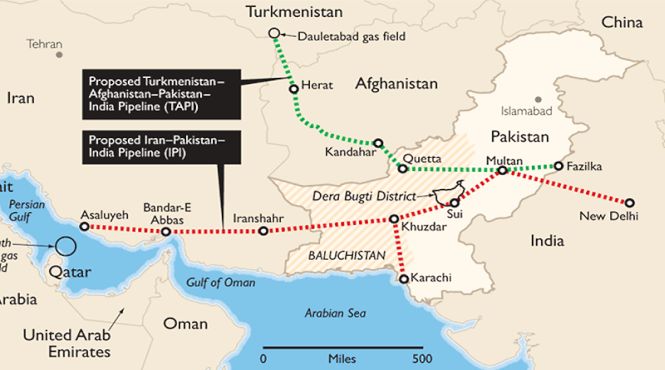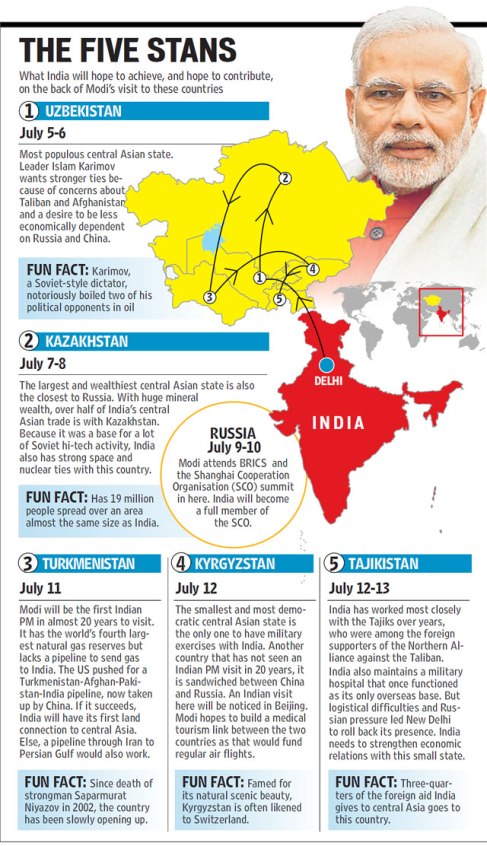Central Asia has long been a strategic location merely because of its proximity to several great powers in Eurasia. The region itself never held a dominant stationary population nor was able to make use of its rich natural resources. Thus, it has rarely throughout history become the seat of power for an empire. Central Asia has been divided and fragmented time and again. It has served more as the battleground for outside powers than as a power in its own right. Central Asian Republics of Kazakhstan, Turkmenistan, Uzbekistan, Tajikistan and Kyrgyzstan are located in the center of the Earth making them attractive for the entire world for its strategic geopolitical importance as it is a region enriched with resources such as Uranium and natural gas that are necessary world over.
Since these nations came into existence in 1991, as a result of the disintegration of the Soviet Union, they are bound by a major Russian influence in their political decision-making. These central Asian Republics have always maintained a close alliance with Russia and had agreements on energy security and trade.
But overtime, other nations have tried indulging in this region for their own benefits of energy security. Like China, through the Shanghai Cooperation Organization which enables it to conduct bilateral energy trade, other countries have formed ties with this region making Russian influence wane over time.
India, being a very close ally of Russia has stepped into this region in the past and yet again for enriching
her energy resources and also for a larger motive of balance of power. Wherein Russia, her ally, plays a major role in Central Asia which India has seized for its own advantage and seen how diplomatic relations can benefit. China on the other hand is also looking out for the its hold in the region for its own use. The central Asian region, sandwiched between Russia and China has finally got the opportunity to move out of the realm of influence and make concrete ties with other nations for mutual benefit. A major opportunity being, India.
PM Modi visited these nations in the month of July and made it an efficient visit by making various promises and agreements whose results are already blooming. The major achievement being the TAPI pipeline (Turkmenistan, Afghanistan, Pakistan, India) which is going to run through these nations and provide natural gas. India needs resources of energy for security and this will enhance her resources in large ways. Companies like OVL have already invested and work has begun.
Apart from this major achievement of his visit, PM Modi also made various agreements over defense, medicine and technology.
His visit started with Uzbekistan where agreements over-supply of atomic trade for Uranium began and military cooperation was strengthened. After which he flew to Ufa, Russia for the SCO summit where PM Modi also met Russian President Vladimir Putin, the Chinese President Xi Jinping and Iranian President Hassan Rouhani who discussed wide-ranging issues, including the strategically important Chabahar port. Discussions over revival of talks over the Mumbai terror attacks began with Pakistan PM Nawaz Sharif.
The next stop at Turkmenistan is where the TAPI pipeline project came to an ultimate go where work has begun and the pipeline is to be functional by 2018. Various other agreements of military and medicine were reached with Kyrgyzstan and Tajikistan.

Overview:
India has four major interests in Central Asia: security, energy, trade and mutual cooperation in various realms. PM Modi does not wish to help the Central Asians build democracy, as do the Americans, but has commerce in mind and is well aware that security and stability are necessary for trade and development. Throughout his visit, he asserted that we had common interests, our issues were common, our heritage was common, and the space had historically been common. He has called for the issues of terrorism, narcotics trafficking and arms smuggling to be addressed with determination.
There is a vast scope for furthering bilateral ties in education and English-language teaching from schools to universities, healthcare, tourism, agriculture and agro-processing industries, pharmaceuticals and drug manufacturing, textiles, petrochemicals, mining, military cooperation, and other allied fields. Cooperation in the field of uranium extraction is ongoing with Kazakhstan, Uzbekistan and Tajikistan.
If Russia and China enter, compete and succeed in Central Asia, can India afford to lag behind? This is the basic question which was left unanswered until our Prime Minister decided to open talks with these nations for a mutual benefiting alliance and bonds of promise. This gives India a chance to balance the power with Russia and China.



Good research and well articulated.
LikeLike